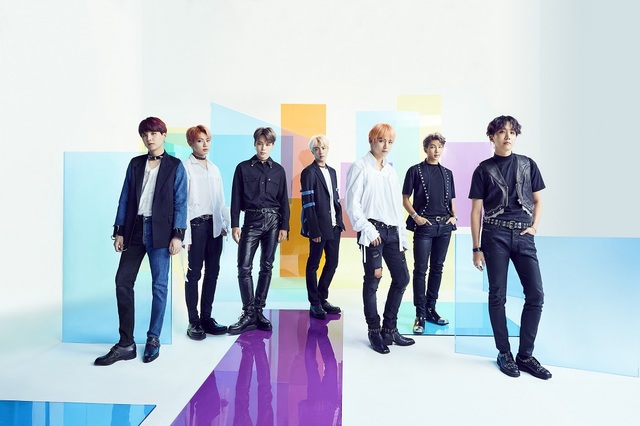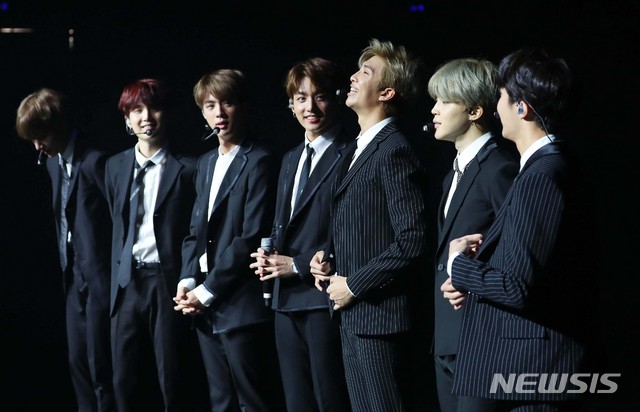



Japan TV Asahi canceled the appearance of BTS Music Station' on the 9th. "Some reported that the T-shirt design that was previously worn by the member (Jimin) was causing a stir," he said. "We had a consultation with our agency (big hit) about the intention to wear it, but we decided to suspend the appearance as a result of comprehensive judgment."
Earlier, local far-right media had previously taken issue with BTS member Jimin, 23, appearing on the air wearing a T-shirt to celebrate Liberation Day, and leader RM, 24, leaving a tweet to commemorate Liberation Day on Twitter Inc. in 2013. He then claimed that BTS was "acting anti-Japanese."
Jimin's T-shirts featured people singing hurrah for liberation, and scenes of atomic bomb droppings; in English, "patriarchy; "our history" and "liberation." "For a nation that has forgotten history, there is no future; thank the independent fighters; long live Korea independent," RM wrote on Twitter Inc.
In December, Fuji TV 'FNS Song Festival', TV Asahi Music Station Super Live' NHK 'Hongbaek Hapjeon' and other big year-end music broadcasts of Japan canceled BTS appearances.
Japan in the face of a backlash
But Japan is facing a backlash, as BTS has grown into a World group, which has been covered by former World major media.
"The background of the cancellation of the Japanese broadcast by BTS is rooted in the long-standing political and cultural problems of both countries," said the US pop music media Billboard. "Jimin's T-shirt is not the only reason for the cancellation."
The media pointed out that Japan dominated Korea during the Second World War, Japan comfort women, and Japan used flags during the Second World War, which symbolized Japan militarism.
CNN also reported on the cancellation of the BTS's Japan broadcast, saying, "The suffering of Koreans due to Japan's colonial rule in the past has been affecting the relationship between the two countries."
The BBC also explained that "Jimin's background in the T-shirt controversy has a historical background in both countries."
Some argue that the recent ruling by the Korean Supreme Court that Japan companies should compensate victims who were forced to cancel the broadcast of Japan during the Japanese colonial rule was influenced by the cancellation of the BTS.
In SNS, posts with a hashtag called '#LiberationTshirtNotBomBTShirt' are being rapidly shared around BTS fan club 'Amy'. Jimin's Liberation Day T-shirts have a hidden meaning and the truth of Korea-Japan history.
BTS, the hate force Out of Sight?
It is worth noting that Jimin wore the T-shirt recently, which Jimin wore during his World tour last year. This is why the analysis shows that BTS is becoming the Out of Sight of the forces I hate. When Korean wave re-ignited around K-pop in the local area, they expressed their threat and aimed at BTS, which has emerged as a popular trend.
Recently, as J-pop has fallen in the World market and K-pop has emerged, the trend of checking K-pop has been continuing, mainly in the extreme right of Japan. "Japan struggled to prevent the popularity of Korean singers from growing," Billboard said.
Professor Seo Kyung-duk of Sungshin Women's University, who is carrying out a distorted history correction campaign, wrote on SNS, "It is really the worst self-help to prevent Japan from appearing on BTS and to report this situation in the far-right media." "It was a chance to make sure that 'Japan is a war criminal country' to former World young fans."
In Japan, there are many eyes that this flow is unusual, such as the voice of magnetism. Japan Amy also says "I apologize to Korea".
Cold water in the third Korean wave?, Korean wave is public!
Some are worried that this incident may be pouring cold water on the third Korean wave boom in Japan, which was created last year and this year. There is also concern that the Korean wave is being re-created by the "disgusting demonstration" held every weekend throughout Japan in 2013.
However, K-pop crazes in the region such as 'Twice' and 'Aizwon', a joint venture between Korea and Japan, are still in the lead. In particular, Japan's Korean wave aid 'TVXQ' attracted 1.28 million people from the '2018 Concert Mobilization Ranking Top 50' published by the December issue of 'NETKei Entertainment', a popular culture magazine of Japan economic newspaper 'NETKei'. It is the number one singer in the local and overseas singers who performed in Japan this year.
As seen in the global popularity of BTS, the proportion of Korean wave's dependence on Japan is gradually decreasing. As a result, there is an analysis that this situation will not shrink K-pop centered on BTS.
The popularity of BTS in Japan is gradually increasing. The ninth local single "Fake Love/Airplane pt.2" released on the 7th reached 327,342 points on the first day, reaching the top of the daily single chart. Last year, it surpassed 269,861 points for its eighth single, "Mike Drop/DNA/Christal Snow," its highest sales record.
BTS will open a 'Love Your Self' Japan Dome tour at Osaka Kyocera Dome, Nagoya Dome, Fukuoka Yahooku! Dome starting from the Tokyo Dome on the 13th ~ 14th. SNS is spreading hashtags such as 'supporting Japan activities of BTS'.